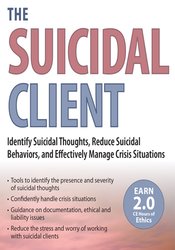

Your work with clients can save lives.
But working with suicidality is a source of extraordinary stress. Being a part of life or death decisions comes with uncertainty, second-guessing, and fears about competence, effectiveness, and responsibility.
Watch this course recording and learn how you can confidently work with suicidal clients with the tools and skills you need to assess for the presence and severity of suicidal thoughts, reduce high-risk and suicidal behaviours, and effectively intervene in crisis situations.
This recording will provide you with:
Discover how you can transform the weight and worry of working with suicidality into the peace of mind of knowing you have what it takes to effectively help clients in their darkest hours.
| File type | File name | Number of pages | |
|---|---|---|---|
| Manual - The Suicidal Client (3.37 MB) | 103 Pages | Available after Purchase |
Glenn Sullivan, Ph.D., is the co-author of The Suicidal Patient: Clinical and Legal Standards of Care (3rd ed.), published by the American Psychological Association, and co-editor of the Handbook of Military and Veteran Suicide, published by Oxford University Press. Dr. Sullivan earned his Ph.D. in clinical psychology at the Pacific Graduate School of Psychology, Palo Alto, California. He completed his clinical pre-doctoral internship at the San Francisco Veterans Affairs Medical Center, and a postdoctoral residency in post-deployment mental health at the Veterans Affairs Medical Center in Salem, Virginia.
Dr. Sullivan is a tenured professor of psychology at the Virginia Military Institute, where he is known for his dynamic and engaging teaching style. He is the recipient of VMI’s Thomas Jefferson Teaching Award, which is presented to a faculty member “deemed especially talented at inspiring students in the development of their intellect and character.”
In addition to his numerous publications and presentations on suicide, Dr. Sullivan maintains an active private practice in Lexington, Virginia. His clinical specializations include psychological assessment, forensic evaluation, and the treatment of combat veterans.
Speaker Disclosure:
Financial: Glenn Sullivan maintains a private practice. He receives a speaking honorarium from PESI, Inc. Glenn has no relevant financial relationships with ineligible organizations.
Non-financial: Glenn Sullivan has no relevant non-financial relationship to disclose.
Please wait ...